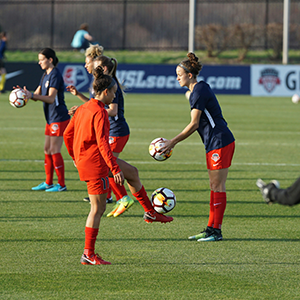Foto de portada de Jeffrey F Lin en Unsplash
Los golpes y moretones son comunes al jugar al fútbol, y no todos los golpes se pueden prevenir, pero hay formas de darle a tu cuerpo la mejor posibilidad de éxito cuando está en el campo.
Esta serie le ofrece algunos consejos básicos para asegurarse de que su cuerpo esté preparado para jugar. Si necesita consejos más detallados sobre cómo mantener su cuerpo en óptimas condiciones para jugar, consulte con un entrenador deportivo o un especialista en medicina deportiva.
Bienestar del jugador: Entrenamiento
Algunos pueden pensar que la práctica está libre de riesgos, pero no siempre es así. Como solo estás entrenando, puedes ser más cauteloso con tu cuerpo.
Antes de comenzar a entrenar, pregúntate: “¿Me siento bien para entrenar ahora mismo?”. Si la respuesta es no, ya sea por enfermedad o lesión, entonces no te presiones. Si la respuesta es sí, puedes comenzar a prepararte para la práctica.
Antes de la práctica, comience con estiramientos y calentamiento del cuerpo. Al comienzo de la práctica, tómese entre 10 y 15 minutos para estirar todos los grupos musculares que se utilizan en el fútbol. Los estiramientos son vitales en el fútbol, ya que pueden ayudar a evitar problemas graves en el cuerpo.
La hidratación antes, durante y después de la práctica es muy importante. Al jugar al fútbol, perderás muchos líquidos a causa del sudor. Tu cuerpo necesita estar hidratado para funcionar correctamente, por lo que si vas a la práctica sin beber agua, corres el riesgo de deshidratarte, lo que puede provocar multitud de problemas. Continuar bebiendo durante y después de la práctica te ayudará a recuperar los líquidos que has perdido durante la práctica.
Prevenir problemas durante el entrenamiento puede ser más fácil de lo que parece. La concentración es importante, escucha a tu entrenador durante la práctica. Ser tonto o no prestar atención puede hacerte más vulnerable a no estar en tu mejor estado físico. Si el entrenador te dice que uses espinilleras porque la próxima actividad es de alta intensidad y no sigues sus instrucciones, corres el riesgo de recibir una patada en la espinilla sin protección.
Usar el equipamiento adecuado es muy importante en el fútbol. Elige un calzado adecuado para la superficie y asegúrate de que tus zapatillas estén bien atadas. Jugar con zapatillas sueltas te da una base inestable y puede contribuir a los resbalones. Usar espinilleras adecuadas es tan importante como usar botas. Obtén más información sobre las espinilleras y cómo comprar las adecuadas para ti.
Después de terminar la práctica, sigue cuidando tu cuerpo. Es necesario hacer un enfriamiento adecuado después de la práctica después de un entrenamiento intenso. Tu cuerpo necesita tiempo para calmarse y relajarse. Los estiramientos, la actividad ligera y la hidratación son partes importantes del enfriamiento. Todas estas actividades previenen el dolor muscular en los días siguientes.
Los días de descanso son importantes en el programa de un deportista. Asegúrate de que tu cuerpo tenga tiempo para recuperarse de la actividad.
Si el entrenamiento de fuerza es importante para ti en tus días libres, asegúrate de no ignorar los grupos musculares que no están relacionados con el fútbol. Fortalecer los músculos de todo el cuerpo hará que todo el cuerpo trabaje en conjunto.
Si está buscando más información sobre cualquier problema que sienta en su cuerpo, comuníquese con un entrenador deportivo o un especialista en medicina deportiva para obtener más información.
Cuidar tu cuerpo no termina con el entrenamiento. Prepararse para el partido es tan importante como prepararse para el entrenamiento. Descubre consejos de bienestar previo al partido en nuestro próximo artículo de mañana.
Bienestar del jugador: antes del juego:
https://soccerpost.com/blogs/news/player-wellness-pregame



